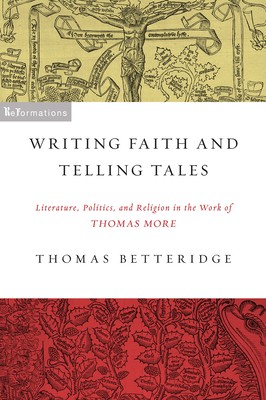
- We will send in 10–14 business days.
- Author: Thomas Betteridge
- Publisher: University of Notre Dame Press
- ISBN-10: 0268022399
- ISBN-13: 9780268022396
- Format: 15.2 x 22.9 x 2 cm, softcover
- Language: English
- SAVE -10% with code: EXTRA
Reviews
Description
Thomas More is a complex and controversial figure who has been regarded as both saint and persecutor, leading humanist and a representative of late medieval culture. His religious writings, with their stark and at times violent attacks on what More regarded as heresy, have been hotly debated. In Writing Faith and Telling Tales, Thomas Betteridge sets More's writings in a broad cultural and chronological context, compares them to important works of late fourteenth- and fifteenth-century vernacular theology, and makes a compelling argument for the revision of existing histories of Thomas More and his legacy.
Betteridge focuses on four areas of More's writings: politics, philosophy, theology, and devotion. He examines More's History of King Richard III as a work of both history and political theory. He discusses Utopia and the ways in which its treatment of reason reflects More's Christian humanism. By exploring three of More's lesser known works, The Supplication of Souls, The Confutation, and The Apology, Betteridge demonstrates that More positioned his understanding of heresy within and against a long tradition of English anti-heretical writing, as represented in the works of Hoccleve, Lydgate, and Love. Finally, Betteridge focuses on two key concepts for understanding More's late devotional works: prayer and the book of Christ. In both cases, Betteridge claims, More seeks to develop a distinctive position that combines late medieval devotionalism with an Augustinian emphasis on the ethics of writing and reading. Writing Faith and Telling Tales poses important questions concerning periodization and confessionalization and will influence future work on the English Reformation and humanist writing in England.
EXTRA 10 % discount with code: EXTRA
The promotion ends in 16d.07:18:28
The discount code is valid when purchasing from 10 €. Discounts do not stack.
- Author: Thomas Betteridge
- Publisher: University of Notre Dame Press
- ISBN-10: 0268022399
- ISBN-13: 9780268022396
- Format: 15.2 x 22.9 x 2 cm, softcover
- Language: English English
Thomas More is a complex and controversial figure who has been regarded as both saint and persecutor, leading humanist and a representative of late medieval culture. His religious writings, with their stark and at times violent attacks on what More regarded as heresy, have been hotly debated. In Writing Faith and Telling Tales, Thomas Betteridge sets More's writings in a broad cultural and chronological context, compares them to important works of late fourteenth- and fifteenth-century vernacular theology, and makes a compelling argument for the revision of existing histories of Thomas More and his legacy.
Betteridge focuses on four areas of More's writings: politics, philosophy, theology, and devotion. He examines More's History of King Richard III as a work of both history and political theory. He discusses Utopia and the ways in which its treatment of reason reflects More's Christian humanism. By exploring three of More's lesser known works, The Supplication of Souls, The Confutation, and The Apology, Betteridge demonstrates that More positioned his understanding of heresy within and against a long tradition of English anti-heretical writing, as represented in the works of Hoccleve, Lydgate, and Love. Finally, Betteridge focuses on two key concepts for understanding More's late devotional works: prayer and the book of Christ. In both cases, Betteridge claims, More seeks to develop a distinctive position that combines late medieval devotionalism with an Augustinian emphasis on the ethics of writing and reading. Writing Faith and Telling Tales poses important questions concerning periodization and confessionalization and will influence future work on the English Reformation and humanist writing in England.


Reviews